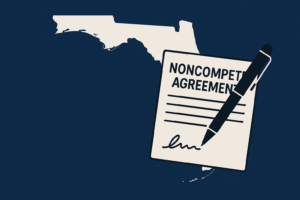April 30, 2025 | Posted By: Hoyer Law Group, PLLC
 Florida is changing the rules around noncompete agreements—and if you’re a high-earning executive, sales professional, or partner in a closely held business, the new law could dramatically impact your career mobility.
Florida is changing the rules around noncompete agreements—and if you’re a high-earning executive, sales professional, or partner in a closely held business, the new law could dramatically impact your career mobility.
On April 24, 2025, the Florida Legislature passed HB 1219, known as the Florida Contracts Honoring Opportunity, Investment, Confidentiality, and Economic Growth (CHOICE) Act. If signed by Governor DeSantis (and we expect it will be), the law will take effect July 1, 2025, and will make it far easier for employers to enforce non-compete agreements and “garden leave” arrangements—but only for workers who meet specific income and structural thresholds.
Before diving into what’s changing, it’s critical to understand how Florida’s current noncompete law works—and how the CHOICE Act builds on it.
Current Florida Noncompete Law: Fla. Stat. § 542.335
Florida is already considered one of the most employer-friendly states in the country when it comes to enforcing restrictive covenants. The current governing statute is Fla. Stat. § 542.335, which has been in place since 1996.
Under this statute:
- A noncompete must be in writing and signed by the employee;
- The employer must demonstrate a “legitimate business interest” justifying the restriction (e.g., protection of trade secrets, confidential information, customer goodwill);
- The restriction must be “reasonably necessary” to protect that business interest;
- Courts evaluate the reasonableness of the time, geographic scope, and line of business involved.
Time Limits Under Existing Law (for other than those selling an interest in a business):
- Restrictions of 6 months or less are presumed reasonable for former employees.
- Restrictions of more than 2 years are presumed unreasonable for most roles—although executives may fall outside those norms depending on their access and influence.
Employees can defeat or limit noncompete enforcement by proving:
- The employer lacks a legitimate business interest;
- The restriction is overly broad in time, geography, or scope;
- Enforcement would result in undue hardship.
Courts applying § 542.335 may also “blue-pencil” (or modify) the agreement to make it enforceable, granting partial relief rather than voiding the agreement entirely.
What’s Different About the CHOICE Act?
The CHOICE Act does not replace § 542.335. Instead, it creates a new, parallel legal pathway—one that grants powerful enforcement rights to employers without requiring them to prove legitimate business interests or necessity, as long as they meet new structural and procedural safeguards.
It creates two new types of enforceable agreements:
- Covered Noncompete Agreements
- Covered Garden Leave Agreements
These tools apply only to a new class of “covered employees,” discussed below.
Who Is Covered Under the CHOICE Act?
The CHOICE Act applies to “covered employees.” If you don’t meet the criteria, the new law doesn’t apply—and the traditional rules under § 542.335 remain in effect.
Under the CHOICE Act, covered employees must be:
- Be an employee or individual contractor;
- Earn (or reasonably be expected to earn) a salary greater than twice the annual mean wage in the applicable Florida county—either where you work or where your employer is based;
- Exclude any discretionary compensation, bonuses, commissions, or other “anticipated but indeterminable” forms of pay from that salary calculation;
- Not be a health care practitioner (as defined under Fla. Stat. § 456.001).
If you meet these criteria, you fall under a new legal regime—one that significantly increases the enforceability of restrictive covenants against you.
What Is a “Covered Noncompete Agreement”?
A covered noncompete agreement allows an employer to restrict your ability to compete for up to four years after your employment ends—without needing to prove the restriction is narrowly tailored or supported by a business necessity.
To qualify, the agreement must:
- Be in writing and define a specific geographic scope;
- Be provided to you at least 7 days before you must sign;
- Include a written notice of your right to seek legal counsel;
- Include your written acknowledgment that you’ll receive confidential information or access to customer relationships;
- Limit your post-employment activities to:
- Work similar to what you performed during the previous 3 years, or
- Work that risks use of the employer’s confidential information or client relationships;
- If a garden leave agreement is also in place, the noncompete duration must be reduced day-for-day by any nonworking portion of the garden leave period.
If all these conditions are met, courts are required to issue a preliminary injunction against you if the employer seeks to enforce the restriction—without requiring any showing of harm or business interest.
For employees, the key takeaways here are the four year time period and the reduction of the burden on the employer by declaring that a mere contractual acknowledgement that confidential information is exchanged is sufficient to satisfy the traditional requirement that an employer demonstrate that a restrictive covenant is necessary to protect the employer’s legitimate business interest.
What Is a “Covered Garden Leave Agreement”?
A covered garden leave agreement is a relatively new concept in Florida law, although it has been long used in other jurisdictions. This provision:
- Allows employers to give up to 4 years of advance notice before ending the employment relationship;
- Requires the employer to continue paying base salary and benefits throughout that notice period;
- Excuses the employee from work after the first 90 days;
- Permits outside employment only with employer consent; and
- Allows the employer to shorten the notice period with 30 days advance written notice.
In essence, these agreements let your employer keep you off the market—while paying you to stay out of the competition.
Can You Challenge a Covered Agreement?
Yes—but the burden is steep.
To stop enforcement under the CHOICE Act, you or your prospective employer must prove—by clear and convincing evidence, using non-confidential information—that one of the following is true:
- You will not perform similar work or use confidential information;
- Your employer breached the agreement and failed to cure it (e.g., stopped paying you), however, termination alone is not a sufficient defense;
- Your new employer is not, and will not be, engaged in a similar line of business within the restricted area.
This is a much higher standard than what’s required under traditional Florida law.
What Does This Mean for Executives, Salespeople, and Equity Holders?
The CHOICE Act will have a direct impact on the professionals we regularly advise, particularly:
- Executives in finance, tech, health-adjacent industries, or SaaS companies;
- Sales professionals with large books of business or deep client relationships;
- Shareholders or partners in privately held companies considering a future exit or business move.
This means your future business plans, exit strategy, and employment mobility could be subject to stricter enforcement and longer restrictions than ever before. Thus, it has never been more important to seek counsel to advise you at the outset, while you’re negotiating your compensation and considering taking that next offer.
Key Takeaways
- Do not assume older legal advice still applies. The CHOICE Act dramatically alters the legal standard for many high-earning professionals.
- Be proactive before signing. Employers are required to notify you of your right to legal counsel. Use it.
- Negotiate wisely. Four-year restrictions are heavy. If you’re giving up mobility, you should be receiving appropriate compensation or carveouts.
- Review current agreements. You may be asked to re-sign or amend existing covenants to bring them under CHOICE Act protection.
Final Word
Florida’s CHOICE Act gives employers a powerful tool to lock in key talent and prevent competitive moves—but only when certain requirements are met. For executives, partners, and top performers, it is essential to understand what you’re signing, what you’re giving up, and how to protect your long-term options.
Need help evaluating or negotiating a noncompete? Our attorneys represent professionals like you—contact us today for a confidential strategy session.

